Create a mock dashboard¶
In this tutorial, you will be guided on how to create an example dashboard on Data Collection platform.
The steps include:
Preconditions¶
active subscription of Orchestra with Data Collection,
an account on Identity Platform with access to the tenant and to Data Collection platform on this tenant,
Orchestra CLI installed (see Installation).
Final result¶
After completing all of the steps in this manual, you will be able to see the following dashboard:
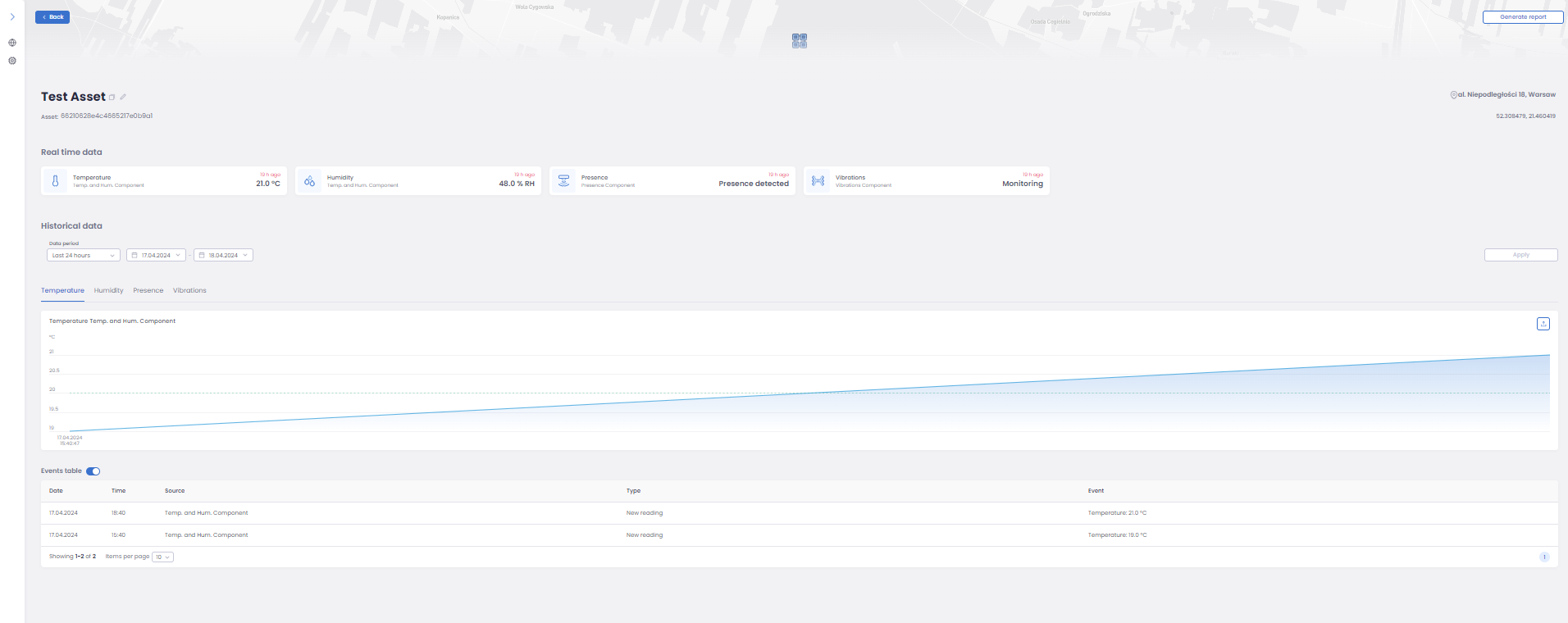
Steps¶
If you have your tenant with an active Orchestra with DC subscription, log in to Data Collection platform and choose your tenant. You should see the platform with no devices that should look like this:
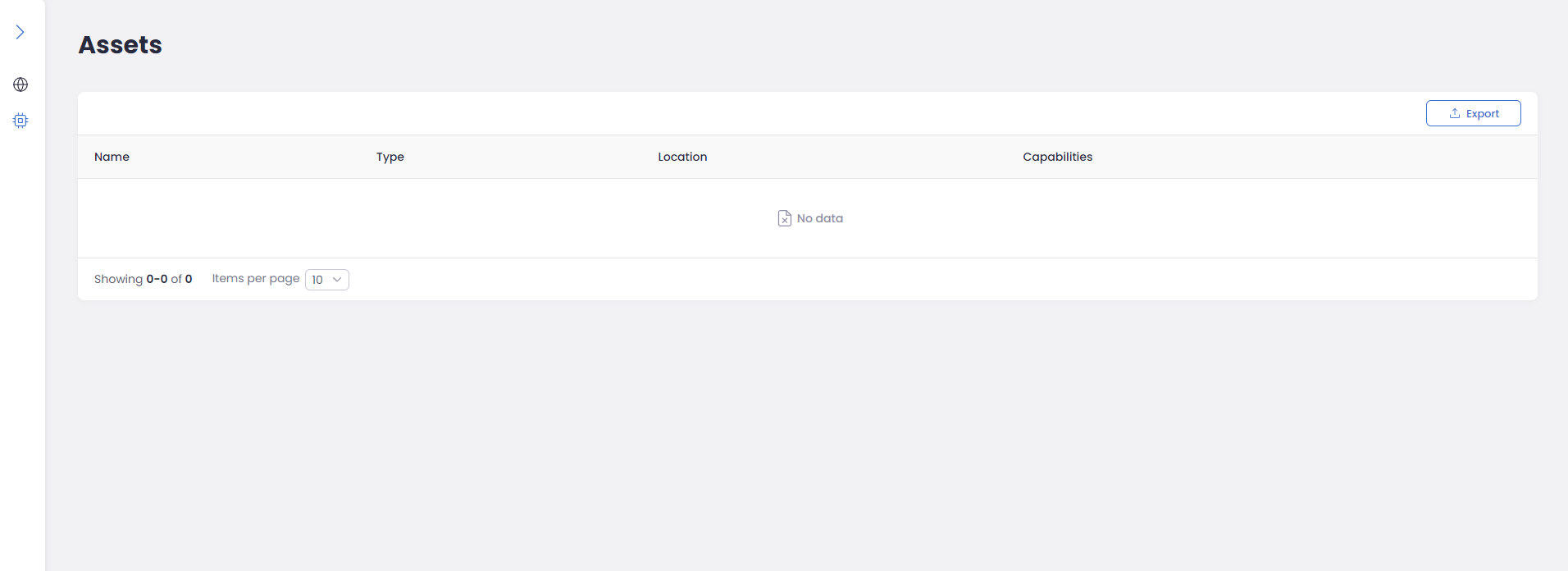
Now we can proceed to create an example DC dashboard.
First, authenticate yourself with Orchestra CLI using the command below:
ocli auth login
Decide on the data format sent by your sensors. Later, we will create 4 components and elements providing different data.
Here are our sample documents:
Element 1
{"temperature": 19, "humidity": 52}
Element 2
{"x": -2.1575, "y": -10.1205, "z": -0.1961}
Element 3
{"event": "Presence detected"}
Creating component types¶
4. Create your first component types that will show you the possibilities of the platform. We will create 4 component types with capabilities that will correspond to the data described above:
TEMPERATURE and HUMIDITY,
VIBRATIONS,
PRESENCE.
Below you will find the commands with outputs to follow.
Temperature and humidity¶
ocli dc component-type create
Component type name: Temp. and Humidity
Please provide supported sensing capabilities separated by commas.
Allowed values are:
TEMPERATURE, HUMIDITY, BRIGHTNESS, NOISE_POLLUTION, PM_1, PM_2_5, PM_10, VIBRATIONS, LUMINAIRE_STATE, SPEAKER_STATE, CO, CO_2, PRESSURE, POWER_3_PHASE, VOLTAGE_3_PHASE, CURRENT_3_PHASE, PHASE_3_PHASE, AMBIENT_LIGHT, BATTERY_VOLTAGE, PRESENCE, ACCELEROMETER_3D_G, NO, NO_2, O3, H2S, SO_2, TVOC
Example:
TEMPERATURE,BRIGHTNESS,O3
Provide supported sensing capabilities: TEMPERATURE,HUMIDITY
Now please specify the format of the data sent by your device's sensors. You will be asked to provide necessary information for each sensor separately.
Add telemetry properties of the first sensor.
1. Provides sensing capability (allowed values: TEMPERATURE, HUMIDITY, BRIGHTNESS, NOISE_POLLUTION, PM_1, PM_2_5, PM_10, VIBRATIONS, LUMINAIRE_STATE, SPEAKER_STATE, CO, CO_2, PRESSURE, POWER_3_PHASE, VOLTAGE_3_PHASE, CURRENT_3_PHASE, PHASE_3_PHASE, AMBIENT_LIGHT, BATTERY_VOLTAGE, PRESENCE, ACCELEROMETER_3D_G, NO, NO_2, O3, H2S, SO_2, TVOC): TEMPERATURE
Telemetry name is used to distinguish between different sensors, for example when one component type has two sensors of the same sensing capability (e.g. two TEMPERATURE sensors).
1. Telemetry name: Temperature
2. Data unit [not required] (allowed values: °C, %, µg/m3, mg/m³, dB, dBm, % RH, m/s², ppm, kPa, hPa, Pa, V, W, A, °, lx, g, MB, s, kWh, Hz): °C
3. Data kind (allowed values: ANY, STRING, INTEGER, FLOAT, BOOLEAN, MAP, ARRAY, INT_ENUM, DATE): FLOAT
Parameters describe the format of the data and where exactly the value is placed in the data document. It can be one of the three types. You can find their descriptions with examples here:
https://coreapi.dc.orchestra.ctiot.io/redoc#tag/Component-types/operation/Create_a_component_type_v1_components_types__post
1. Choose parameters type from the following (ParamSingleKey, ParamMultipleKey, ParamGroupKey): ParamSingleKey
Provide 'key' values separated by commas.
Example:
temperature,value
key: temperature
Do you want to add telemetry properties for another sensor in this component? [y/N]: y
1. Provides sensing capability: HUMIDITY
2. Telemetry name: Humidity
3. Data unit [not required] (allowed values: °C, %, µg/m3, mg/m³, dB, dBm, % RH, m/s², ppm, kPa, hPa, Pa, V, W, A, °, lx, g, MB, s, kWh, Hz): % RH
4. Data kind: FLOAT
5. Choose parameters type from the following (ParamSingleKey, ParamMultipleKey, ParamGroupKey): ParamSingleKey
Provide 'key' values separated by commas.
Example:
temperature,value
key: humidity
Do you want to add telemetry properties for another sensor in this component? [y/N]: n
Vibrations¶
ocli dc component-type create
Component type name: Vibrations
Please provide supported sensing capabilities separated by commas.
Allowed values are:
TEMPERATURE, HUMIDITY, BRIGHTNESS, NOISE_POLLUTION, PM_1, PM_2_5, PM_10, VIBRATIONS, LUMINAIRE_STATE, SPEAKER_STATE, CO, CO_2, PRESSURE, POWER_3_PHASE, VOLTAGE_3_PHASE, CURRENT_3_PHASE, PHASE_3_PHASE, AMBIENT_LIGHT, BATTERY_VOLTAGE, PRESENCE, ACCELEROMETER_3D_G, NO, NO_2, O3, H2S, SO_2, TVOC
Example:
TEMPERATURE,BRIGHTNESS,O3
Provide supported sensing capabilities: VIBRATIONS
Now please specify the format of the data sent by your device's sensors. You will be asked to provide necessary information for each sensor separately.
Add telemetry properties of the first sensor.
1. Provides sensing capability (allowed values: TEMPERATURE, HUMIDITY, BRIGHTNESS, NOISE_POLLUTION, PM_1, PM_2_5, PM_10, VIBRATIONS, LUMINAIRE_STATE, SPEAKER_STATE, CO, CO_2, PRESSURE, POWER_3_PHASE, VOLTAGE_3_PHASE, CURRENT_3_PHASE, PHASE_3_PHASE, AMBIENT_LIGHT, BATTERY_VOLTAGE, PRESENCE, ACCELEROMETER_3D_G, NO, NO_2, O3, H2S, SO_2, TVOC): VIBRATIONS
Telemetry name is used to distinguish between different sensors, for example when one component type has two sensors of the same sensing capability (e.g. two TEMPERATURE sensors).
1. Telemetry name: Vibrations
2. Data unit [not required] (allowed values: °C, %, µg/m3, mg/m³, dB, dBm, % RH, m/s², ppm, kPa, hPa, Pa, V, W, A, °, lx, g, MB, s, kWh, Hz): g
3. Data kind (allowed values: ANY, STRING, INTEGER, FLOAT, BOOLEAN, MAP, ARRAY, INT_ENUM, DATE): MAP
Parameters describe the format of the data and where exactly the value is placed in the data document. It can be one of the three types. You can find their descriptions with examples here:
https://coreapi.dc.orchestra.ctiot.io/redoc#tag/Component-types/operation/Create_a_component_type_v1_components_types__post
1. Choose parameters type from the following (ParamSingleKey, ParamMultipleKey, ParamGroupKey): ParamMultipleKey
For each value that makes up the measurement, provide 'name' and 'key' values separated by commas.
Example:
For a measurement sent like that: {"gps": { "lat": 52.12, "lng": 21.22}}
Provide the following values:
name: lat, key: gps,lat
name: lng, key: gps,lng
... etc.
Add the first value.
name: X
key: x
Do you want to add another one? [y/N]: y
name: Y
key: y
Do you want to add another one? [y/N]: y
name: Z
key: z
Do you want to add another one? [y/N]: n
Do you want to add telemetry properties for another sensor in this component? [y/N]: n
Presence¶
ocli dc component-type create
Component type name: Presence
Please provide supported sensing capabilities separated by commas.
Allowed values are:
TEMPERATURE, HUMIDITY, BRIGHTNESS, NOISE_POLLUTION, PM_1, PM_2_5, PM_10, VIBRATIONS, LUMINAIRE_STATE, SPEAKER_STATE, CO, CO_2, PRESSURE, POWER_3_PHASE, VOLTAGE_3_PHASE, CURRENT_3_PHASE, PHASE_3_PHASE, AMBIENT_LIGHT, BATTERY_VOLTAGE, PRESENCE, ACCELEROMETER_3D_G, NO, NO_2, O3, H2S, SO_2, TVOC
Example:
TEMPERATURE,BRIGHTNESS,O3
Provide supported sensing capabilities: PRESENCE
Now please specify the format of the data sent by your device's sensors. You will be asked to provide necessary information for each sensor separately.
Add telemetry properties of the first sensor.
1. Provides sensing capability (allowed values: TEMPERATURE, HUMIDITY, BRIGHTNESS, NOISE_POLLUTION, PM_1, PM_2_5, PM_10, VIBRATIONS, LUMINAIRE_STATE, SPEAKER_STATE, CO, CO_2, PRESSURE, POWER_3_PHASE, VOLTAGE_3_PHASE, CURRENT_3_PHASE, PHASE_3_PHASE, AMBIENT_LIGHT, BATTERY_VOLTAGE, PRESENCE, ACCELEROMETER_3D_G, NO, NO_2, O3, H2S, SO_2, TVOC): PRESENCE
Telemetry name is used to distinguish between different sensors, for example when one component type has two sensors of the same sensing capability (e.g. two TEMPERATURE sensors).
2. Telemetry name: Presence
3. Data unit [not required] (allowed values: °C, %, µg/m3, mg/m³, dB, dBm, % RH, m/s², ppm, kPa, hPa, Pa, V, W, A, °, lx, g, MB, s, kWh, Hz):
4. Data kind (allowed values: ANY, STRING, INTEGER, FLOAT, BOOLEAN, MAP, ARRAY, INT_ENUM, DATE): STRING
Parameters describe the format of the data and where exactly the value is placed in the data document. It can be one of the three types. You can find their descriptions with examples here:
https://coreapi.dc.orchestra.ctiot.io/redoc#tag/Component-types/operation/Create_a_component_type_v1_components_types__post
5. Choose parameters type from the following (ParamSingleKey, ParamMultipleKey, ParamGroupKey): ParamSingleKey
Provide 'key' values separated by commas.
Example:
temperature,value
key: event
Do you want to add telemetry properties for another sensor in this component? [y/N]: n
Creating components¶
5. Now please create 4 components with the newly created types. Each time you create one, you will be prompted to choose a component type from the list and input its ID. Below you will find a detailed description of the flow.
Important
Remember to save IDs of all of the components created. They will be needed to push example telemetry data.
Temperature and humidity¶
ocli dc component create
Component name: Temp. and Hum. Component
Do you want to use one of the existing component types? [y/N]: y
[
{
"id": "6620f5e190bf68da3e814885",
"name": "Temp. and Humidity",
"element_type_id": "6620f5e0d72ed631f15c081f",
"sensing_capabilities": [
"TEMPERATURE",
"HUMIDITY"
]
},
{
"id": "6620f7f2ec65359a9d9e4694",
"name": "Vibrations",
"element_type_id": "6620f7f2da264508a1fc1c3a",
"sensing_capabilities": [
"VIBRATIONS"
]
},
{
"id": "6620f89431ff57ca57c798fc",
"name": "Presence",
"element_type_id": "6620f893bbc2709d1a65ddd7",
"sensing_capabilities": [
"PRESENCE"
]
}
]
Choose a component type from the list above (input the ID): 6620f5e190bf68da3e814885
Vibrations¶
Alternatively, you can provide component-type-id as an option if you know it already:
ocli dc component create -c 6620f7f2ec65359a9d9e4694
Component name: Vibrations Component
Presence¶
ocli dc component create -c 6620f89431ff57ca57c798fc
Component name: Presence Component
The next step is adding mock telemetry data for all of our components. To achieve that, you will need element IDs of the newly created components. If you don’t remember them, just run the following command to find out:
ocli dc component list --mode json
[
{
"name": "Temp. and Hum. Component",
"component_type_id": "6620f5e190bf68da3e814885",
"element_id": "6620f98208a70b084d642b75",
"element_type_id": "6620f5e0d72ed631f15c081f",
"twin_id": "b901569b-ba5e-4a17-9e1c-877e32fbd344",
"created_at": "2024-04-18T10:44:19.012000+00:00",
"updated_at": "2024-04-18T10:44:19.012000+00:00",
"id": "6620f983f22cd2a1dda5be2c",
"component_type_name": "Temp. and Humidity",
"capabilities": [
{
"kind": "SENSOR",
"sensing_capabilities": [
"TEMPERATURE",
"HUMIDITY"
]
}
]
},
{
"name": "Vibrations Component",
"component_type_id": "6620f7f2ec65359a9d9e4694",
"element_id": "6620f9e602956125a884cb60",
"element_type_id": "6620f7f2da264508a1fc1c3a",
"twin_id": "4ce61a51-2ef0-444c-a9da-1fa84de0bf10",
"created_at": "2024-04-18T10:45:58.446000+00:00",
"updated_at": "2024-04-18T10:45:58.446000+00:00",
"id": "6620f9e6ec65359a9d9e4695",
"component_type_name": "Vibrations",
"capabilities": [
{
"kind": "SENSOR",
"sensing_capabilities": [
"VIBRATIONS"
]
}
]
},
{
"name": "Presence Component",
"component_type_id": "6620f89431ff57ca57c798fc",
"element_id": "6620fa1d08a70b084d642b78",
"element_type_id": "6620f893bbc2709d1a65ddd7",
"twin_id": "5f97998d-305e-4fa3-b08a-ea647b4dfc19",
"created_at": "2024-04-18T10:46:53.853000+00:00",
"updated_at": "2024-04-18T10:46:53.853000+00:00",
"id": "6620fa1d6dd74d0c63d3b445",
"component_type_name": "Presence",
"capabilities": [
{
"kind": "SENSOR",
"sensing_capabilities": [
"PRESENCE"
]
}
]
}
]
Now, use the IDs to push telemetry (2 documents for each element). In the commands below, swap the IDs with the IDs of your elements. Remember to slightly change timestamps for data from one element.
ocli dc component push-telemetry -e 6620f98208a70b084d642b75 --ts 2024-04-17T13:40:47.008+00:00 '{"temperature": 19, "humidity": 52}'
ocli dc component push-telemetry -e 6620f98208a70b084d642b75 --ts 2024-04-17T16:40:47.008+00:00 '{"temperature": 21, "humidity": 48}'
ocli dc component push-telemetry -e 6620f9e602956125a884cb60 --ts 2024-04-17T13:40:47.008+00:00 '{"x": -2.1575, "y": -10.1205, "z": -0.1961}'
ocli dc component push-telemetry -e 6620f9e602956125a884cb60 --ts 2024-04-17T16:40:47.008+00:00 '{"x": -4.1575, "y": -8.1205, "z": -1.1961}'
ocli dc component push-telemetry -e 6620fa1d08a70b084d642b78 --ts 2024-04-17T13:40:47.008+00:00 '{"event": "Presence detected"}'
ocli dc component push-telemetry -e 6620fa1d08a70b084d642b78 --ts 2024-04-17T16:40:47.008+00:00 '{"event": "Presence detected"}'
Creating an asset¶
The last step of the flow is adding an asset containing all of the newly created components. To achieve that, follow the steps below:
ocli dc asset create
Provide asset name: Test Asset
Choose a component from the list below:
[
{
"name": "Temp. and Hum. Component",
"component_type_id": "6620f5e190bf68da3e814885",
"element_id": "6620f98208a70b084d642b75",
"element_type_id": "6620f5e0d72ed631f15c081f",
"twin_id": "b901569b-ba5e-4a17-9e1c-877e32fbd344",
"created_at": "2024-04-18T10:44:19.012000+00:00",
"updated_at": "2024-04-18T10:44:19.012000+00:00",
"id": "6620f983f22cd2a1dda5be2c",
"component_type_name": "Temp. and Humidity",
"capabilities": [
{
"kind": "SENSOR",
"sensing_capabilities": [
"HUMIDITY",
"TEMPERATURE"
]
}
]
},
{
"name": "Vibrations Component",
"component_type_id": "6620f7f2ec65359a9d9e4694",
"element_id": "6620f9e602956125a884cb60",
"element_type_id": "6620f7f2da264508a1fc1c3a",
"twin_id": "4ce61a51-2ef0-444c-a9da-1fa84de0bf10",
"created_at": "2024-04-18T10:45:58.446000+00:00",
"updated_at": "2024-04-18T10:45:58.446000+00:00",
"id": "6620f9e6ec65359a9d9e4695",
"component_type_name": "Vibrations",
"capabilities": [
{
"kind": "SENSOR",
"sensing_capabilities": [
"VIBRATIONS"
]
}
]
},
{
"name": "Presence Component",
"component_type_id": "6620f89431ff57ca57c798fc",
"element_id": "6620fa1d08a70b084d642b78",
"element_type_id": "6620f893bbc2709d1a65ddd7",
"twin_id": "5f97998d-305e-4fa3-b08a-ea647b4dfc19",
"created_at": "2024-04-18T10:46:53.853000+00:00",
"updated_at": "2024-04-18T10:46:53.853000+00:00",
"id": "6620fa1d6dd74d0c63d3b445",
"component_type_name": "Presence",
"capabilities": [
{
"kind": "SENSOR",
"sensing_capabilities": [
"PRESENCE"
]
}
]
}
]
Please list ids of selected components separated by commas: 6620f983f22cd2a1dda5be2c,6620f9e6ec65359a9d9e4695,6620fa1d6dd74d0c63d3b445
Do you want to add another one? [y/N]: n
Do you want to specify the address? [y/N]: y
Please provide address details:
Provide line1: al. Niepodległości 18
Provide line2:
Provide zip: 02-653
Provide city: Warsaw
Provide region:
Provide country: Poland
Provide longitude: 21.460418626497578
Provide latitude: 52.30847862124759
Successfully created the asset!
Results¶
The sample dashboard has been created! Assets list view should look like that:
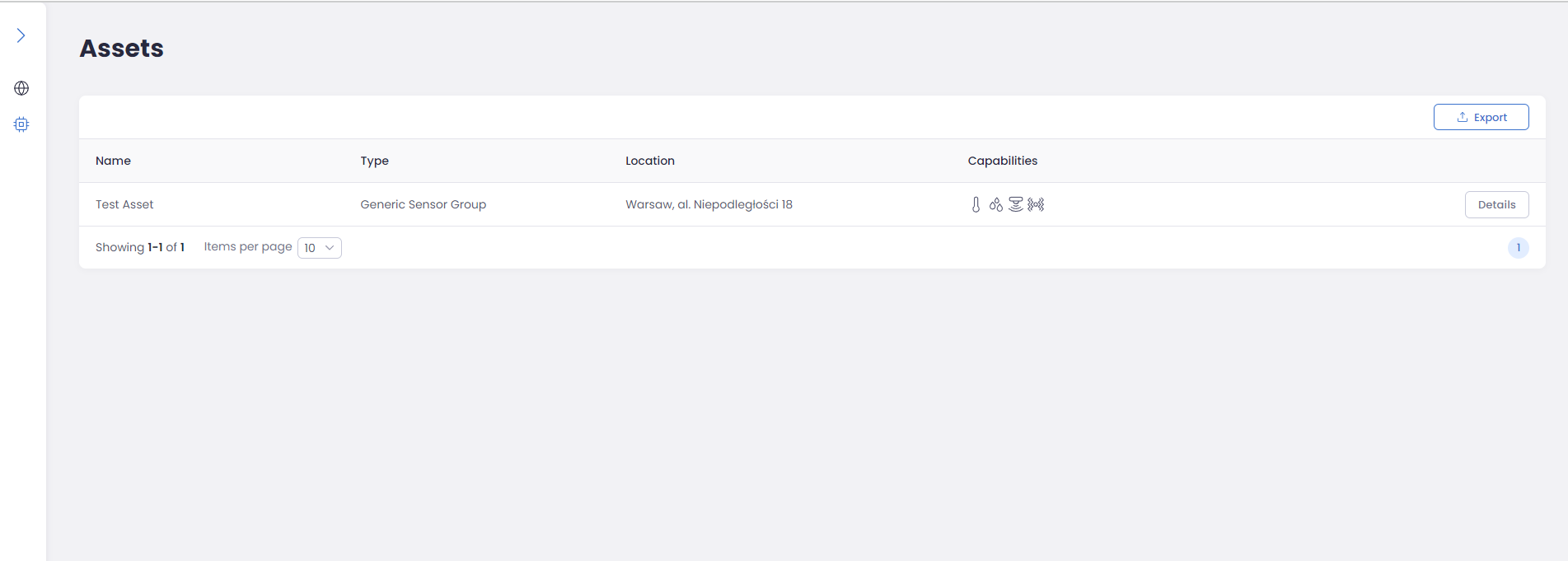
Individual dashboards¶
Temperature¶

Humidity¶
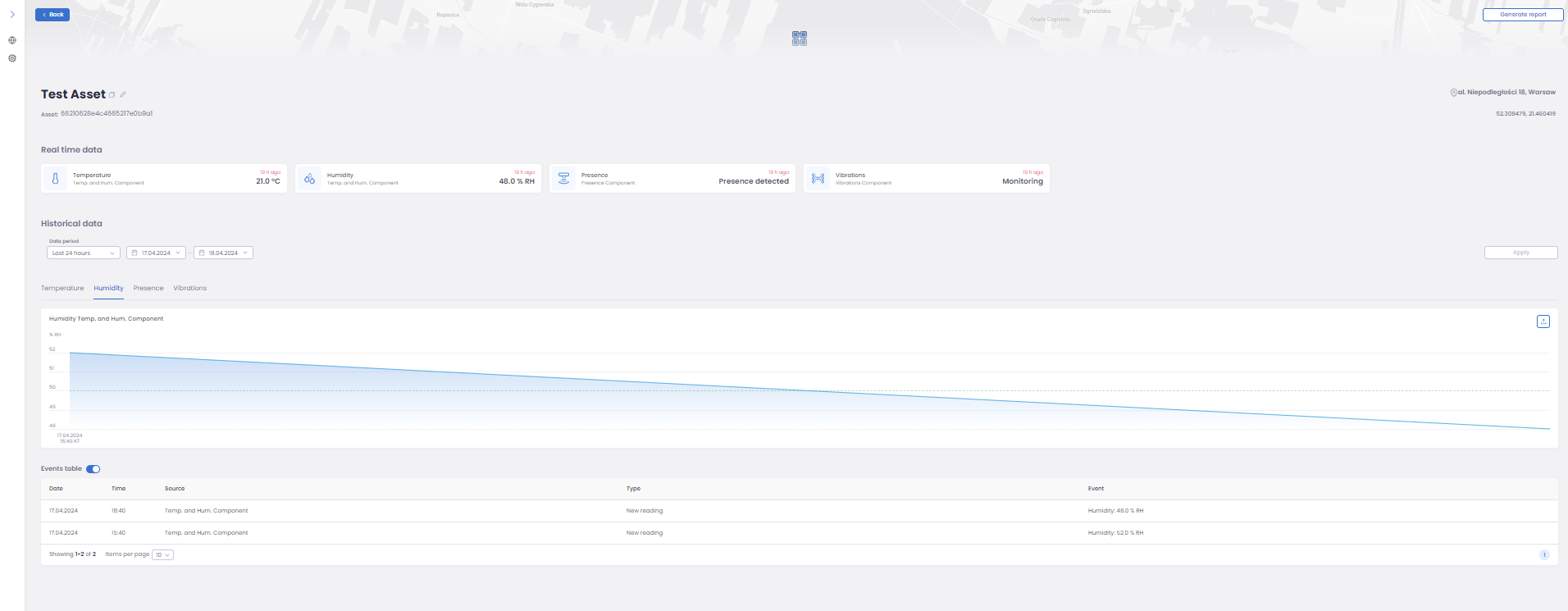
Vibrations¶
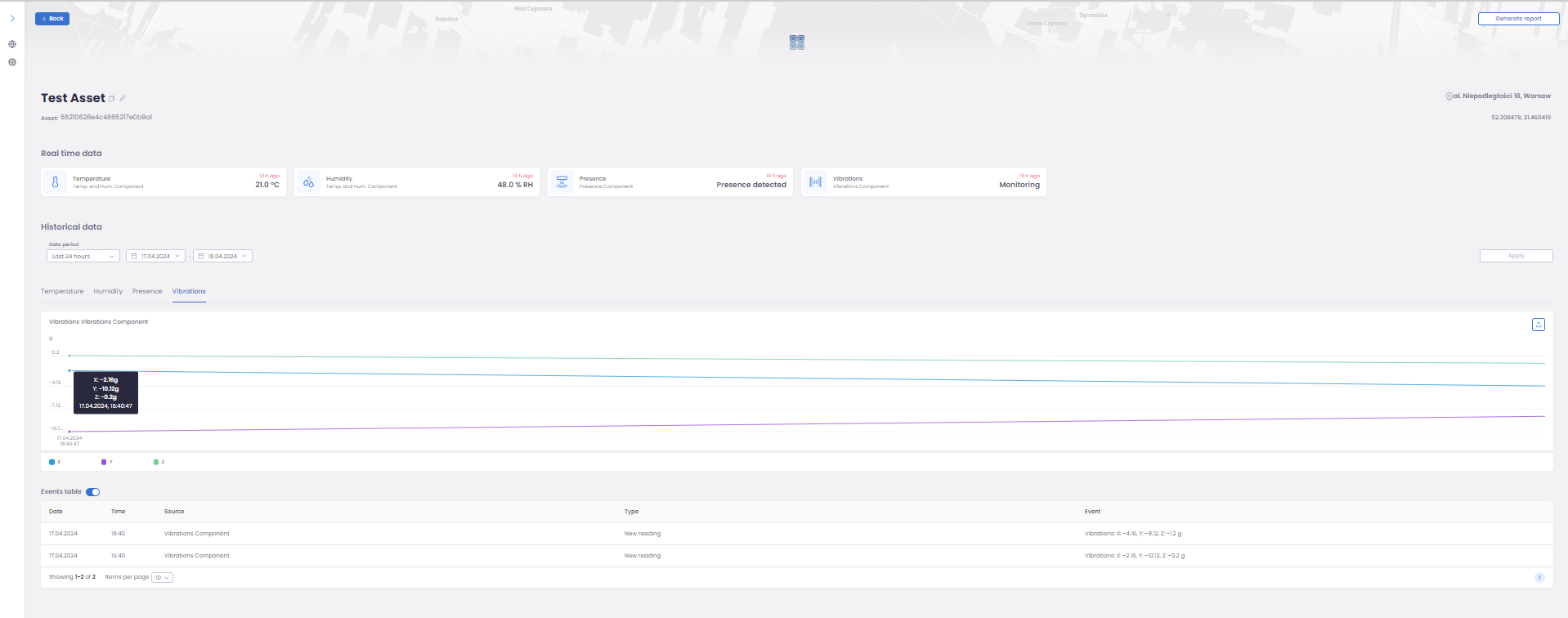
Presence¶
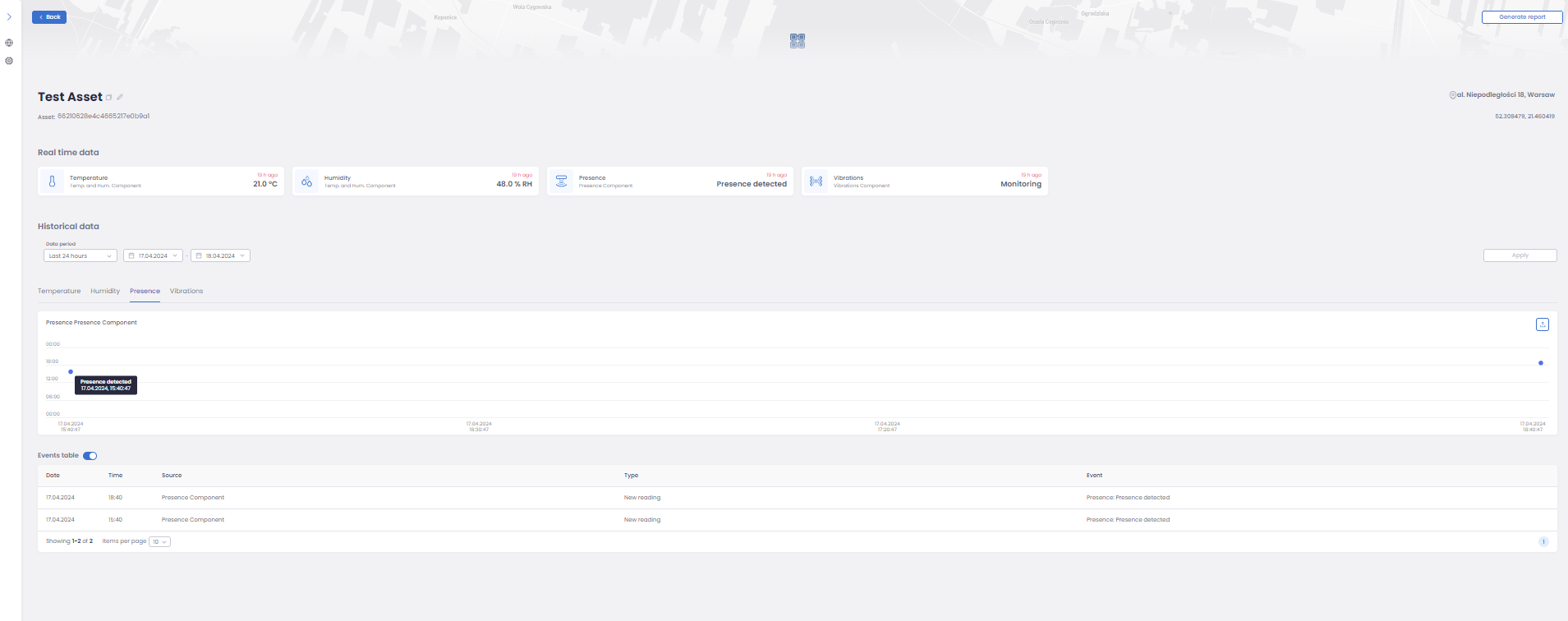
Finally, you can clean up your tenant’s database and remove all the component types, components and asset created during this tutorial.
ocli dc asset cleanup 649b6d603fd1bb1f70f4611b
Asset deleted.